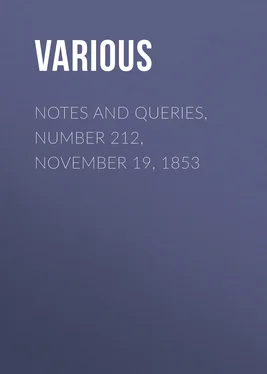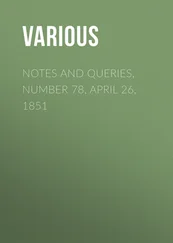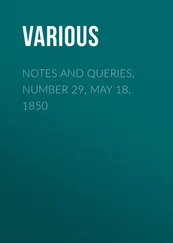Various - Notes and Queries, Number 212, November 19, 1853
Здесь есть возможность читать онлайн «Various - Notes and Queries, Number 212, November 19, 1853» — ознакомительный отрывок электронной книги совершенно бесплатно, а после прочтения отрывка купить полную версию. В некоторых случаях можно слушать аудио, скачать через торрент в формате fb2 и присутствует краткое содержание. Жанр: foreign_antique, periodic, foreign_edu, на английском языке. Описание произведения, (предисловие) а так же отзывы посетителей доступны на портале библиотеки ЛибКат.
- Название:Notes and Queries, Number 212, November 19, 1853
- Автор:
- Жанр:
- Год:неизвестен
- ISBN:нет данных
- Рейтинг книги:4 / 5. Голосов: 1
-
Избранное:Добавить в избранное
- Отзывы:
-
Ваша оценка:
- 80
- 1
- 2
- 3
- 4
- 5
Notes and Queries, Number 212, November 19, 1853: краткое содержание, описание и аннотация
Предлагаем к чтению аннотацию, описание, краткое содержание или предисловие (зависит от того, что написал сам автор книги «Notes and Queries, Number 212, November 19, 1853»). Если вы не нашли необходимую информацию о книге — напишите в комментариях, мы постараемся отыскать её.
Notes and Queries, Number 212, November 19, 1853 — читать онлайн ознакомительный отрывок
Ниже представлен текст книги, разбитый по страницам. Система сохранения места последней прочитанной страницы, позволяет с удобством читать онлайн бесплатно книгу «Notes and Queries, Number 212, November 19, 1853», без необходимости каждый раз заново искать на чём Вы остановились. Поставьте закладку, и сможете в любой момент перейти на страницу, на которой закончили чтение.
Интервал:
Закладка:
"Jan. 7, Friday. This day, at four in the afternoon, Mr. Pullen was buried in St. Peter's Church, in the chapel at the north side of the chancell. All the parishioners were invited, and the pall was held up by six Heads of Houses, though it should have been by six Masters of Arts, as Dr. Radcliffe's pall should have been held up by Doctors in Physic, and not by Doctors of Divinity and Doctors of Law."—P. 32.
Dr. Radcliffe's funeral had taken place in the preceding month.
In Nichols's Literary Anecdotes , vol. iv. p. 181., is the following epitaph of Pullen, drawn up by Mr. Thomas Wagstaffe:
"Hic jacet reverendus vir Josia Pullen, A.M. Aulæ Magd. 57 annos vice principalis, necnon hujusce ecclesiæ Pastor 39 annos. Obiit 31 oDecembris, anno Domini 1714, ætatis 84."
From the notice of Thomas Walden, in Johnson's Lives of the Poets , it appears that Yalden was a pupil of Pullen. (See also Walton's Life of Sanderson , towards the end.) I hope this may elicit some farther account of a man whose name has survived so long in Oxford memory.
As to the tree, I have some recollection of having heard that it had a few years ago a narrow escape of being thrown down, sometime about the vice-chancellorship of Dr. Symons, who promptly came forward to the rescue. Was it ever in such peril? and, if so, was it preserved?
Balliolensis.FOLK LORE
Ancient Custom in Warwickshire. —In Sir William Dugdale's Diary , under the year 1658, is noted the following:
"On All Hallow Even, the master of the family antiently used to carry a bunch of straw, fired, about his corne, saying,
'Fire and red low,
Light on my teen low.'"
Can any of your readers learned in ancient lore explain the custom and the meaning of the couplet, well as its origin? Does it now at all prevail in that county?
J. B. Whitborne.Nottinghamshire Customs. —1. The 29th of May is observed by the Notts juveniles not only by wearing the usual piece of oak-twig, but each young loyalist is armed with a nettle, as coarse as can be procured, with which instrument of torture are coerced those unfortunates who are unprovided with "royal oak," as it is called. Some who are unable to procure it endeavour to avoid the penalty by wearing "dog-oak" (maple), but the punishment is always more severe on discovery of the imposition.
2. On Shrove Tuesday, the first pancake cooked is given to Chanticleer for his sole gratification.
3. The following matrimonial custom prevails at Wellow or Welley, as it is called, a village in the heart of the county. The account is copied from the Notts Guardian of April 28, 1853:
"Wellow. It has been a custom from time immemorial in this parish, when the banns of marriage are published, for a person, selected by the clerk, to rise and say 'God speed them well,' the clerk and congregation responding, Amen! Owing to the recent death of the person who officiated in this ceremony, last Sunday, after the banns of marriage were read, a perfect silence prevailed, the person chosen, either from want of courage or loss of memory, not performing his part until after receiving an intimation from the clerk, and then in so faint a tone as to be scarcely audible. His whispered good wishes were, however, followed by a hearty Amen, mingled with some laughter in different parts of the church."
I do not know whether any notices of the above have appeared in "N. & Q.," and send to inquire respecting 1. and 3. whether a similar custom holds elsewhere; and whether 2. has any connexion with the disused practice of cock-shying?
Furvus.Minor Notes
A Centenarian Couple. —The obituary of Blackwood's Magazine for August, 1821, contains the following:
"Lately, in Campbell, County Virginia, Mr. Chas. Layne, sen., aged 121 years, being born at Albemarle, near Buckingham county, 1700. He has left a widow aged 110 years, and a numerous and respectable family down to the fourth generation. He was a subject of four British sovereigns, and a citizen of the United States for nearly forty-eight years. Until within a few years he enjoyed all his faculties, and excellent health."
The above extract is followed by notices of the deaths of Anne Bryan, of Ashford, co. Waterford, aged 111; and Wm. Munro, gardener at Rose Hall, aged 104.
Cuthbert Bede, B.A."Veni, vidi, vici." —To these remarkable and well-known words of the Roman general, I beg to forward two more sententious despatches of celebrated generals:
Suwarrow. "Slava bogu! Slava vam!
Krepost Vzala, yiatam."
"Glory to God and the Empress! Ismail's ours."
It is also stated, I do not know on what authority, that the old and lamented warrior, Sir Charles Napier, wrote on the conquest of Scinde, "Peccavi."
Perhaps some of your correspondents could add a few more pithy sentences on a like subject.
G. Lloyd.Dublin.
Autumnal Tints. —Scarce any one can have failed to notice the unusual richness and brilliance of the autumnal tints on the foliage this year. I have more particularly remarked this in Clydesdale, the lake districts of Cumberland and Westmoreland, and in Somersetshire and Devonshire. Can any of the contributors to "N. & Q." inform me if attributable to the extraordinary wetness of the season?
R. H. B.Variety is pleasing. —Looking over my last year's note-book, I find the following morceau , which I think ought to be preserved in "N. & Q.:"
"Nov. 30, 1851. Observed in the window of the Shakspeare Inn a written paper running thus:
'To be raffled for:
The finding of Moses, and six
Fat geeze(!!).
Tickets at the bar.'"
Kidderminster.
Rome and the Number Six. —It has been remarked lately in "N. & Q." that in English history, the reign of the second sovereign of the same name has been infelicitous. I cannot turn to the note I read, and I forget whether it noticed the remarks in Aubrey's Miscellanies (London, 8vo., 1696), that "all the second kings since the Conquest have been unfortunate." It may be worth the while to add (what is remarked by Mr. Matthews in his Diary of an Invalid ), that the number six has been considered at Rome as ominous of misfortune. Tarquinius Sextus was the very worst of the Tarquins, and his brutal conduct led to a revolution in the government; under Urban the Sixth, the great schism of the West broke out; Alexander the Sixth outdid all that his predecessors amongst the Tarquins or the Popes had ventured to do before him; and the presentiment seemed to receive confirmation in the misfortunes of the reign of his successor Pius VI., to whose election was applied the line:
"Semper sub sextis perdita Roma fuit."
Newcastle-on-Tyne.
Zend Grammar. —The following fragment on Zend grammar having fallen in my way, I inclose you a copy, as the remarks contained in it may be of service to Oriental scholars.
I am unable to state the author's name, although I suspect the MS. to be from a highly important quarter. The subject-matter, however, is sufficiently important to merit publication.
"The Zend , of disputed authenticity, and the Asmani Zuban , a notoriously fictitious tongue, compared."
"It is well known that Sanscrit words abound in Zend ; and that some of its inflexions are formed by the rules of the Vyacaran or Sanscrit grammar.
"It would therefore seem quite possible that by application of these rules a grammar might be written of the Zend . Would such a composition afford any proof of the disputed point—the authenticity of the Zend ?
Читать дальшеИнтервал:
Закладка:
Похожие книги на «Notes and Queries, Number 212, November 19, 1853»
Представляем Вашему вниманию похожие книги на «Notes and Queries, Number 212, November 19, 1853» списком для выбора. Мы отобрали схожую по названию и смыслу литературу в надежде предоставить читателям больше вариантов отыскать новые, интересные, ещё непрочитанные произведения.
Обсуждение, отзывы о книге «Notes and Queries, Number 212, November 19, 1853» и просто собственные мнения читателей. Оставьте ваши комментарии, напишите, что Вы думаете о произведении, его смысле или главных героях. Укажите что конкретно понравилось, а что нет, и почему Вы так считаете.












